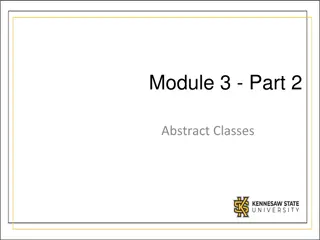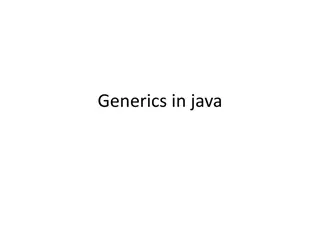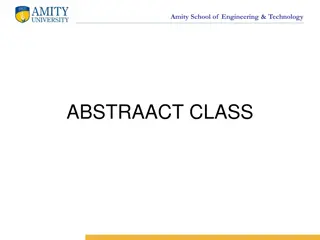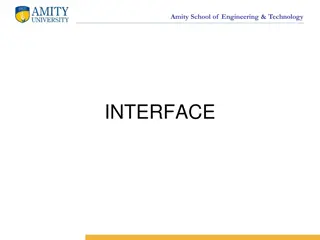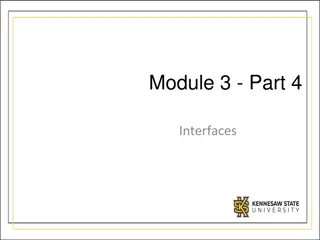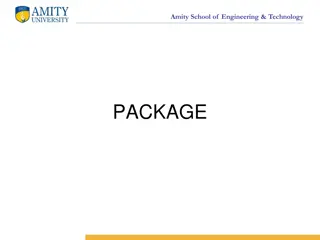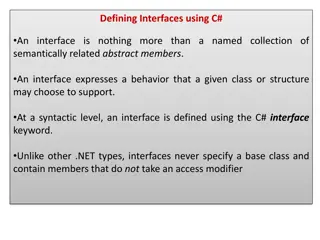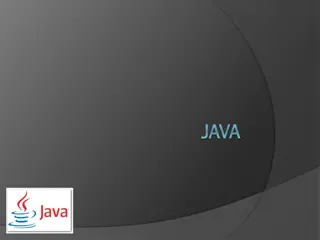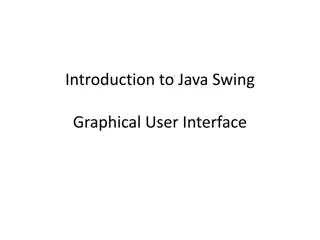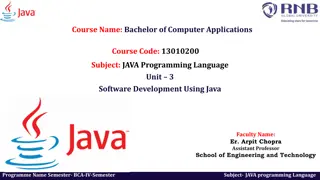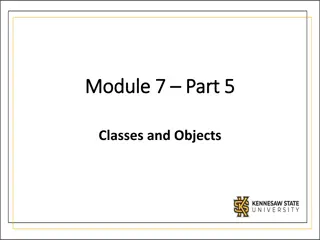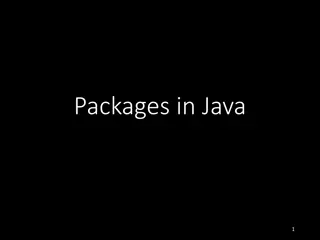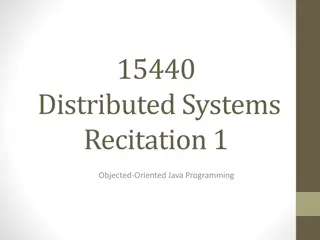Understanding Interfaces and Classes in Java
Explore the concept of interfaces and classes in Java programming. Learn about defining methods in interfaces, implementing interfaces in classes, and the relationship between classes and interfaces. Discover how interfaces can be used to define a common set of methods that classes must implement, leading to more flexible and modular code structures.
Download Presentation

Please find below an Image/Link to download the presentation.
The content on the website is provided AS IS for your information and personal use only. It may not be sold, licensed, or shared on other websites without obtaining consent from the author. Download presentation by click this link. If you encounter any issues during the download, it is possible that the publisher has removed the file from their server.
E N D
Presentation Transcript
What did we talk about last time? Objects Classes Enums Packages
An interfaceis a set of methods which a class must have Implementingan interface means making a promise to define each of the listed methods It can do what it wants inside the body of each method, but it musthave them to compile A class can implement as many interfaces as it wants
An interface looks a lot like a class, but all its methods are empty In Java 8 and higher, default implementations can be given, but never mind that now Interfaces have no members except for (static final) constants public interface Guitarist { void strumChord(Chord chord); void playMelody(Melody notes); }
public class RockGuitarist extends RockMusician implements Guitarist { public void strumChord( Chord chord ) { System.out.print("Totally wails on that " + chord.getName() + " chord!"); } } public void playMelody( Melody notes ) { System.out.print("Burns through the notes " + notes.toString() + " like Jimmy Page!" ); }
A class has an is-a relationship with interfaces it implements, just like a superclass it extends Code that specifies a particular interface can use any class that implements it public static void perform(Guitarist guitarist, Chord chord, Melody notes) { System.out.println("Give it up " + "for the next guitarist!"); guitarist.strumChord( chord ); guitarist.playMelody( notes ); }
Let's look at the List<E> interface Some of its methods: boolean add(E element) void add(int index, E element) void clear() E get(int index) int size() boolean remove(Object o)
There are lots of different ways of keeping a list of data The List interface doesn't care how we do it And there are lots of implementations that Java provides: ArrayList LinkedList Stack Vector You can use whichever you think best suits your task in terms of efficiency
Many interfaces only have a single method Consider the following example: public interface NoiseMaker { String makeNoise(); } To implement this interface, a class must: State that it implements the interface Have a public, non-static method called makeNoise() that takes no parameters and returns a String
Here are classes that implement NoiseMaker: public class Pig implements NoiseMaker { public String makeNoise() { return "Grunt!"; } } public class Explosion implements NoiseMaker { public String makeNoise() { return "BOOM!"; } } public class Wind implements NoiseMaker { public String makeNoise() { return "Woosh!"; } }
If an object implements an interface, it can be used wherever that interface is needed because we know it can do the job NoiseMaker[] noiseMakers = new NoiseMaker[100]; noiseMakers[0] = new Wind(); We could pass a Pig, Explosion, or Wind object to the scareChildren() method public static void scareChildren(NoiseMaker maker) { System.out.println("Hey, kids!"); System.out.println(maker.makeNoise()); }
When a child class extends a parent class, it gains all of its members and methods When a class implements an interface, it's promising to have all of the capabilities required by that interface In Java, it's impossible to extend more than one parent class However, a single class can implement an unlimited number of interfaces It has the capabilities required by each of the interfaces Many unrelated classes could implement the same interface
In addition to the NoiseMaker interface, consider the following interfaces: public interface Colored { Color getColor(); } public interface Operation { int process(int a, int b); }
Here is a class that implements all three interfaces: public class LoudPinkAdder implements NoiseMaker, Colored, Operation { public String makeNoise() { return "Bang!"; } public Color getColor() { return Color.PINK; } public int process(int a, int b) { return a + b; } }
Given an arbitrary object, it's possible to tell if it implements a specific interface As with extending classes, you can use the instanceof keyword to see if an object is an instance of an interface What an ugly keyword! After you discover that an object implements an interface, you can cast it to that interface and call methods defined by that interface Don't cast something to an interface it doesn't have or you'll get a ClassCastException and crash your program!
public void tryToMakeNoise(Object object) { // Check for interface if(object instanceof NoiseMaker) { // Perform cast NoiseMaker maker = (NoiseMaker)object; System.out.println(maker.makeNoise()); } else System.out.println("Can't make noise."); }
Lab 2 tomorrow On Friday, we'll talk about defining and extending interfaces
Keep reading Chapter 10 Get started on Project 1


